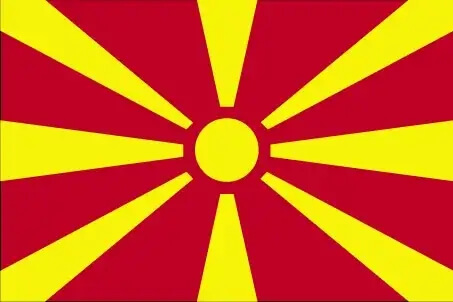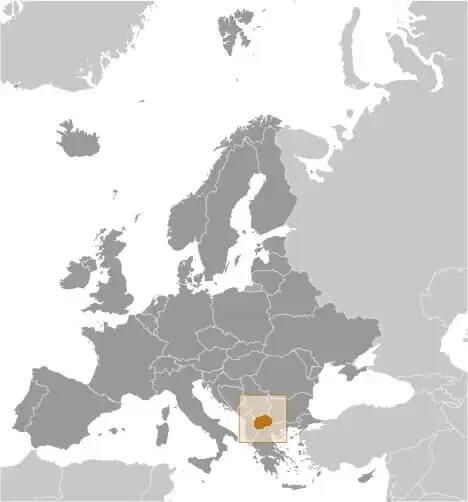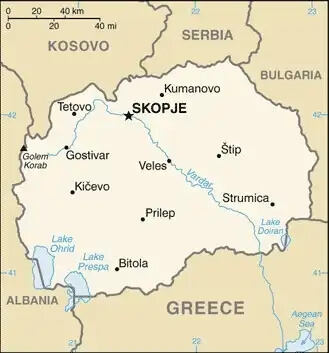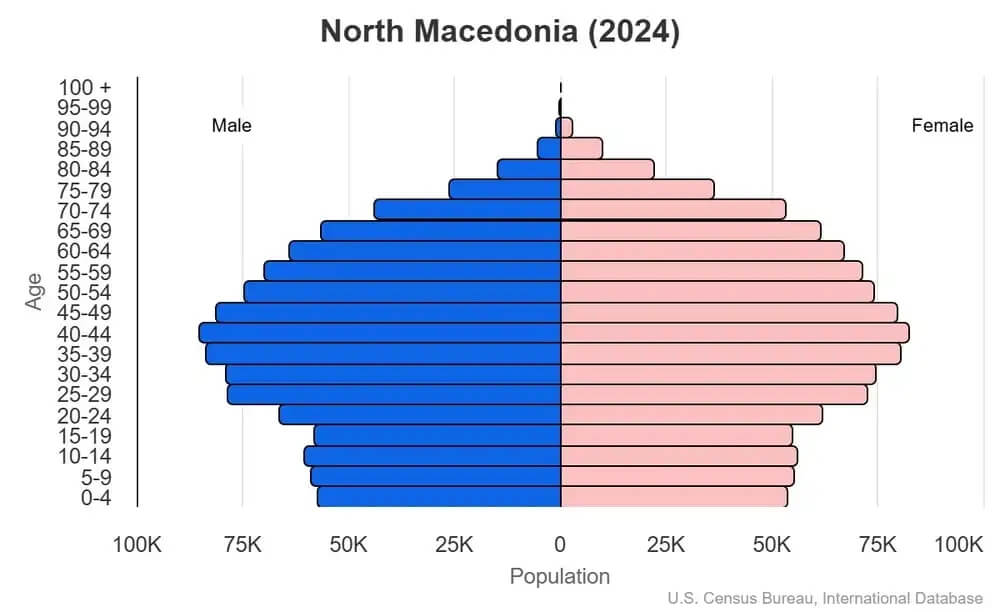World Book
North Macedonia
World Book Index
70


With a score of 70, the country is ranked 62nd out of 158 countries in the World Book ranking. (more information)
Introduction
North Macedonia gained its independence peacefully from Yugoslavia in 1991 under the name "Macedonia." In 2018, Macedonia signed the Prespa Accord with Greece, agreeing to change its name to the Republic of North Macedonia, and the agreement went into force on 12 February 2019.
Neighboring countries
Albania - Bulgaria - Greece - Kosovo - Serbia
Geography
Area
total: 25,713 sq km
land: 25,433 sq km
water: 280 sq km
Climate
warm, dry summers and autumns; relatively cold winters with heavy snowfall
Natural resources
low-grade iron ore, copper, lead, zinc, chromite, manganese, nickel, tungsten, gold, silver, asbestos, gypsum, timber, arable land
People and Society
Population
total: 2,135,622 (2024 est.)
Ethnic groups
Macedonian 58.4%, Albanian 24.3%, Turkish 3.9%, Romani 2.5%, Serb 1.3%, other 2.3%, no ethnic affiliation data available 7.2% (2021 est.)
Languages
Macedonian (official) 61.4%, Albanian (official) 24.3%, Turkish 3.4%, Romani 1.7%, other (includes Aromanian (Vlach) and Bosnian) 2%, unspecified 7.2% (2021 est.)
Religions
Macedonian Orthodox 46.1%, Muslim 32.2%, other Christian 13.8%, other and non-believers 0.5%, unspecified 7.4% (2021 est.)
Population growth rate
0.1% (2024 est.)
Government
Government type
parliamentary republic
Capital
name: Skopje
Executive branch
chief of state: President Gordana SILJANOVSKA-DAVKOVA (since 12 May 2024)
head of government: Prime Minister Hristijan MICKOSKI (since 23 June 2024)
Diplomatic representation in the US
chief of mission: Ambassador Zoran POPOV (since 16 September 2022)
Diplomatic representation from the US
chief of mission: Ambassador Angela AGGELER (since 8 November 2022)
Economy
Economic overview
upper-middle-income European economy; GDP growth driven by private consumption, public infrastructure investments, and wage growth; stalled progress on EU accession; public debt rising due to high pensions, wages, and interest payments; structural challenges of emigration, low productivity growth, and governance
Real GDP (purchasing power parity)
$43.844 billion (2024 est.)
$42.668 billion (2023 est.)
$41.801 billion (2022 est.)
Real GDP per capita
$24,500 (2024 est.)
$23,300 (2023 est.)
$22,800 (2022 est.)
Exports
$10.445 billion (2024 est.)
$10.691 billion (2023 est.)
$10.123 billion (2022 est.)
Exports - partners
Germany 39%, Serbia 8%, Bulgaria 6%, Greece 5%, Czechia 3% (2023)
Exports - commodities
reaction and catalytic products, insulated wire, electricity, garments, seats (2023)
Imports
$12.644 billion (2024 est.)
$12.748 billion (2023 est.)
$13.009 billion (2022 est.)
Imports - partners
UK 12%, Germany 10%, Greece 9%, China 9%, Serbia 8% (2023)
Imports - commodities
platinum, refined petroleum, laboratory ceramic ware, cars, natural gas (2023)
Human Development Index
The country's Human Development Index (HDI) is 0.815, ranking it 68th out of 193 countries tested. (more information)
World Happiness Report
The World Happiness Report ranked the country 70th out of 158 countries tested with a score of 5.866. (more information)



